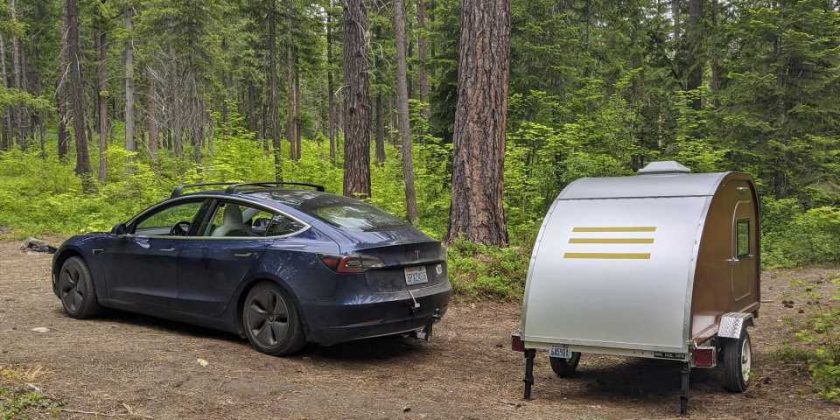The Tesla Model 3 beats owner’s expectations when it comes to towing.
Towing a teardrop camper is highly viable – and you can expect a range of about ~150 miles for 1000 pounds of trailer. Obviously, this depends on road conditions, trailer type, and wind conditions.
Editor’s Note: This article was originally posted on Reddit. The author granted InsideEVs permission to use it here.
A few months back, I was searching online for information about towing with the Model 3 and how it impacts consumption. Sadly, I was unable to find any information, so I decided when I test this out I would share my results!
So first the obligatory picture of our Adventure-Ready Model 3 (before properly raised hitch).
First, we decided we would take this setup for a test drive around the neighborhood. We drove it for a total of 32 miles on roads at speeds of about 45-50mph. This included hills and stop lights/stop signs. In our first initial test, we received an average Wh/mile of 348. This was great news for us, but we were still concerned because it wasn’t highway driving.
With our viability test completed, we decided we would take this setup for a long drive and go from ~Edmonds, WA to Leavenworth, WA. For those that don’t know the area, this trip involves going over a mountain pass. Sadly for this test, we had a maximum speed of 55mph as that was the max speed the trailer tires are rated for.
The beginning part of the drive we found that at 55mph we averaged ~375 Wh/mile. We made it to the Supercharger before the pass with a higher than expected state of charge (~79% and started with ~90). We decided to charge back up to 90 since we didn’t know what consumption over the pass would look like.
Well, here’s the data you have been waiting for. At the highest part of the pass, I took the following photo.
We used ALOT of power going over the pass. Then again, this was fully expected. We went from ~90% down to about ~40% (Sorry, I didn’t write down exact numbers). While that’s terrible consumption (50% capacity drain in 50 miles), it’s actually better than we expected. It proved that we could pull our trailer over a mountain pass with plenty of capacity to spare.
Going back down the other side was a breeze! Sadly, with the trailer on the back, there is much more drag, which means you won’t regenerate much power going down. However, we basically used 2% of the battery for the next 20 miles. We pulled off the highway to camp at Fish Lake, and when we arrived, we had an average Wh/mile of 402. At this point, we had about 36% battery left.
Ideally, we would have camped at a campground with a 50amp plug to charge, but with COVID, all campgrounds were closed. With the trailer unhooked, we went down to Leavenworth, charged up to 90%, and came back to camp.
At this point in time, I have to stop sharing our numbers because our odometer is skewed because we drove this part of the journey without the trailer. By the end of the weekend, we had a state of charge at 60%. With this 60%, we were able to go back over the pass and make it back to the original Supercharger. We only charged up 10% there and were able to make it back home with ~20% battery left.
So with this, I can honestly say towing with the Model 3 completely beat my expectations. Acceleration isn’t a problem, braking isn’t a problem. With this lightweight trailer, we barely noticed we were towing anything. We expected that our range with the trailer was going to be about 120 miles, but I can now easily say at 55mph with this trailer we could probably safely plan for 150 miles between chargers. In many cases, you could probably even get 170 miles of range, but I will always plan for 150.
Oh, I shouldn’t admit this … but Autopilot works great with a trailer attached! Just make sure you turn off NOA.
Hopefully, this is helpful for those who are considering towing with their M3.
Source: Read Full Article



